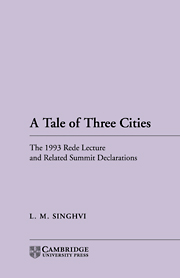A tale of three cities: the Rede Lecture 1993
Published online by Cambridge University Press: 16 October 2009
Summary
I consider it a great honour and a rare privilege to be appointed by the Vice-Chancellor of Cambridge University to the ancient office created by Sir Robert Rede's executors by a deed of 10 December 1524.
I join the distinguished galaxy of my illustrious predecessors with utmost hesitation but at the same time with the greatest pleasure. I recall the story of two bishops, one of whom introduced the other to an audience freely using hyperbole in praising him. When the other bishop rose to speak, he said he had two apologies to make: one apology on behalf of his friend, the bishop who introduced him with a profusion of superlatives, because the friendly bishop had exceeded the bounds of truth. The other apology, he said, was on his own behalf – for enjoying what the other bishop had said in his praise. I think I might also make two apologies, one on behalf of the Vice-Chancellor for his error of choice and the other on my own behalf for enjoying it so much.
Lord Denning told me once that, as a lawyer, he derived particular pleasure (as a judge he called it wicked pleasure), when he undeservedly won a case which lacked merit. As to the merit of the present speaker, I shall say nothing, but I am in a position to testify that Lord Denning was quite right about a certain pleasure in undeserved gain.
- Type
- Chapter
- Information
- A Tale of Three CitiesThe 1993 Rede Lecture and Related Summit Declarations, pp. 55 - 78Publisher: Cambridge University PressPrint publication year: 1996
- 1
- Cited by



